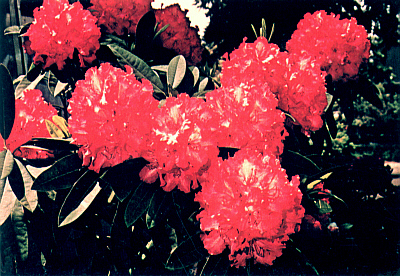QBARS - v27n4 'Pink Petticoats' Premiere
'Pink Petticoats' Premiere
Jack Lofthouse, Vancouver, B. C.

|
|
R. 'Pink Petticoats'
Photo by Jack Lofthouse |
After a somewhat delayed debut, 'Pink Petticoats' will be available this fall in limited quantities. But to the few of us in the Vancouver, B.C. area, who have had 'Pink Petticoats' flaunting her flamboyant beauty in our gardens during the past few years, she is well worth the wait.
A picotee frilled pink, with huge 9 to 10 inch trusses of up to 32 flowers it has the unique ability to change its radiance under varying light conditions. An ever changing beauty.
It first bloomed in 1963, four years from seed, from a capsule of 'Jan Dekens', believed selfed. I now consider this to be in error. It is more characteristic of a recent cross of 'Jan Dekens' by 'Britannia', although none have produced another 'Pink Petticoats'.
'Pink Petticoats' is a good commercial rhododendron. It roots easily with modern propagation methods, and sets early flower buds. It can be brought into bloom easily in containers (even the gallon size), to a well branched compact plant. Because of its showy bloom it should be placed in a conspicuous, well chosen, fertile location, preferably to be seen through windows from within the home. Provide high filtered shade from the hot sun of mid May to early June (its long blooming period). It does well in northern exposures that have plenty of overhead light. Being a heavy feeder, it benefits from three controlled feedings of a good rhododendron fertilizer plus added iron. In Vancouver, these are applied at the end of March. end of May, and the middle of July. Mulch in the form of grass clippings is applied in spring and early summer. Adequate water should be provided when new growth is developing. In hardiness, it should be similar to its parents. It survived -5 degrees Fahrenheit in the winter of 1968-1969.
'Pink Petticoats' received a cup for the best new hybrid, and the best plant in show, at Vancouver in 1968. This was the only time it was exhibited in competition. It received an A.R.S. conditional award in 1971.
Hybrids with 'Pink Petticoats' as a parent have already been bloomed. Many show the genetic factors of its large globular truss with its extra florets. Crosses of R. yakushimanum with 'Pink Petticoats' show promise. A selection from the above cross has been registered as 'Pirouette'.
